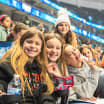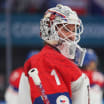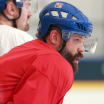Sitting in his locker room stall after a long day at Great Park Ice, former Ducks forward turned junior hockey coach Emerson Etem had little trouble identifying the differences in Ducks Development Camp from his early days as an NHL prospect.
For starters, they didn't have the state-of-the-art facility in Irvine to call home for a week, he noted with a big laugh. But much deeper than that, Etem spoke of observing a new philosophy in player training and development, highlighting intensified focuses on nutrition, fitness, personal development and leadership.
The similarities, though, were a little more difficult to cite. Beyond a burning desire to compete, that list is short.
Etem, Uisprapassorn Offer Ducks Coaches Unique Perspective at Dev Camp
Both SoCal Born Coaches are part of the NHLCA's BIPOC Coaches Program
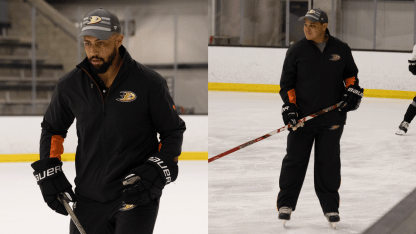
By
Matt Weller
AnaheimDucks.com
"It's all about education," he explained. "At development camp, there's always competition but [then] there was less teaching, more compete and seeing where your cardio was mid-summer. This is just so much more applicable to what they're going to need heading into this upcoming season, wherever they're at."
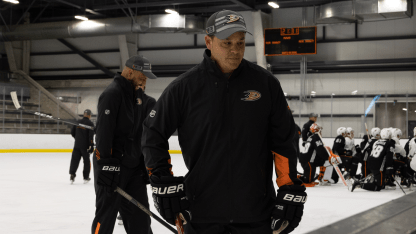
Etem, alongside Orange County native Sam Uisprapassorn, joined the Ducks coaches at development camp in July as part of the NHL Coaches Association BIPOC (Black, Indigenous and People of Color) Coaches Program, shadowing the staff on and off the ice for the full week.
For Etem, the experience was an opportunity to reflect on the memories of his playing days and to use those experiences as a guide in the next step of his budding coaching career.
After his playing days concluded, the former first round pick initially tried his hand behind the bench managing the Missoula Junior Bruins in Montana. A year later, with the backing of the BIPOC Coaches program, Etem brought a USPHL team to his Long Beach hometown, a junior tier-III organization based at the The Rinks - Lakewood Ice.
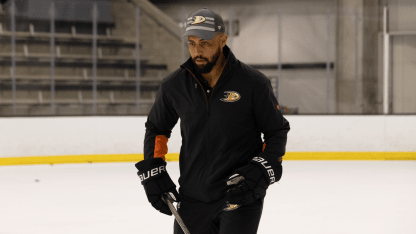
Etem said he certainly draws from what he learned in his playing days, but his new role has opened his eyes up to the other side of the game. He's far from a disciplinarian, but now sees the spots where tough love is required, a balance he took the time to further study at camp with Ducks head coach Dallas Eakins.
"I appreciate both sides of it. I think both sides of a coaching style can get things out of players in different ways," Eakins said. "For me, what I learned was to make sure you are present and available. Any question a player has, take a second to really dissect it. That's something I saw with Dallas, that ability, along with the staff. It's infectious, and it starts with the staff and management."
Etem now turns his focus to applying those principles to his own team and players. The majority of NAPHL athletes are not bound for the NHL or the NCAA's top-tier D-I programs, but the league offers players the opportunity to earn a college hockey roster spot at a school that further advances their career aspirations off the ice, too.
Etem says it's a different environment than what he experienced in his juniors days, but he feels an immense sense of gratitude to the BIPOC program, which helped pave the way in bringing the Shredders to life.
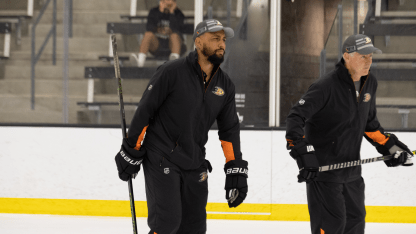
"Everything I've ever needed every step of the way in my journey of coaching, they have been right they're and offering whatever they can do," Etem said of the program, which also includes Ducks goaltending coach Sudarshan "Sudsie" Maharaj and Blues head coach Craig Berube. "They wrote a letter in support of me purchasing a franchise, which was huge."
For Eakins and his staff, having the Etem-Uisprapassorn duo on-site all week was an opportunity to compare tactics, strategies and philosophies from different sources of unique backgrounds, occasionally forcing the pro coaches to challenge their pre-existing beliefs and ponder how they can best connect with the new generation of athletes.
"They come in and gain a whole lot of knowledge, but they also always leave something behind," Eakins said. "They leave us a better organization. They leave something behind that they done, that they've thought of or that they've experienced. And I'm always like, You know what? We haven't thought of that."
But much more important than the on-ice development, the gesture was also an example by Eakins and his staff that the organization's professed commitment to diversity and inclusiveness should be prevalent in everything it touches, from something as monumental as the ocV!BE development surrounding Honda Center to another as niche as summer hockey training.
"The NHL and the coaches association have gone just a wonderful job of really recognizing that we need to open up our doors to make sure we're inclusive of women, people of color, anyone," Eakins said. "For us, the Samueli family are the leaders of this organization...They drive the bus on the leadership side of how we're going to be inclusive, how we're going to constantly try for more knowledge and how we're going to support our community.
"It shouldn't matter the color of your skin, your gender or your sexual preference. I don't understand that mindset...If you've earned it and you're good at the job, you've earned it. You bring the right culture, you're great at your job. Just get the best people."
Etem said he sees the sport continue to make progress towards its motto of making hockey truly "for everyone," highlighting how opportunities like this one help put people from underrepresented communities in positions to advance up the ladder. That said, there remains a steep hill to climb, a peak where actions not words will drive future change.
"I think we're getting into a transition period of less talking, more action," Etem said. "Of course, it's still being talked about, but I think everyone is seeing it and getting more comfortable with it...We need to make sure that [everyone], regardless of race, color, whatever, is afforded the opportunity to play so we have the chance to see another Auston Matthews or another Sidney Crosby. That's just for the overall betterment of the game itself."
Etem said it never bothered him that most of his coaches did not look like him, saying he "just showed up to work every day, no matter what the situation was," but acknowledged that sort of familiarity could make a difference to those now wearing the shoes he once did as an unknown rookie.
"We show up in and put in blood, sweat and tears," Etem said. "With all the work we have put in, no matter the barriers in the way, it's nice to see how far the game has come. I'd put it that way.
"If I can have that impact as a far as giving back, it's certainly a goal of mine."
-
Sam Uisprapassorn's name may not carry the same weight in traditional hockey circles as Etem's, but in terms of offering a fresh, unique perspective on the sport and its future direction, few are more qualified than the just-turned 43-year-old from Costa Mesa.
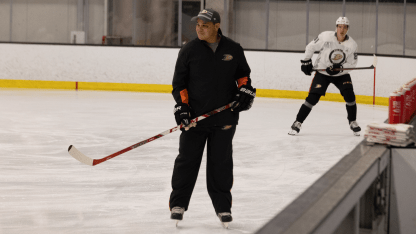
Born to a Thai father and Colombian mother, Uisprapassorn fell in love with the sport when the LA Kings acquired the legendary Wayne Gretzky in 1988, completely unaware of how much it and a soon-to-be-announced Orange County NHL franchise would become central to his life's path.
He spent summers learning to skate at Paramount Iceland, one of Southern California's most historic rinks, and fine-tuned his stick skills in any street hockey game he could find with friends.
More than eager to play the sport in full, Uisprapassorn got his first taste of ice hockey when he joined one of the inaugural Jr. Ducks teams, based out of what was then called Disney Ice in downtown Anaheim. Years later he met his wife, Cara, at a Ducks game at Honda Center, eventually proposing in the empty arena at center ice.
The affable Uisprapassorn began his rise behind the bench modestly, like most do, teaching the basics of the game to local kids. It wasn't a career move or a gesture meant to kickstart larger aspirations. He just loved the game and wanted to pass along that knowledge to hockey's next generation.
Then, one evening in 2014, while watching the Ducks and poking around on his iPad, Uisprapassorn came across a video of a game featuring his father's native Thailand. It occurred to him then, if the sport is expanding to previously unreached areas of Asia, Africa and South America, what is going on in mom's home country of Colombia, and how can I help?
So on a whim, Uisprapassorn sent in an email to the Federación Colombiana de Hockey Sobre Hielo, completely unaware of the country's hockey structure, facilities or players and with no expectations towards any potential role. At first -- for three months in fact -- he heard nothing and assumed the message had fallen on deaf ears. But then, seemingly randomly, he got a response. Colombia needed a coach for a tournament in Mexico City. Next week.
A coach? Of what team? Next week? In Mexico? Admittedly, Uisprapassorn had more than a few questions, but after mulling it over for all of one millisecond, he started packing his bags. The opportunity was more than he could have ever imagined, and he intended to take full advantage.
In the eight years since, Uisprapassorn has dedicated himself to growing the game in the South American country and beyond. He's now the Colombian National Ice Hockey Team's head coach, overseeing men's and women's national squads and youth teams at the U-10, U-12, U-16 and U-20 levels, as well as designing and implementing hockey development programs to expand the country's talent pool.
Like Etem, he raves about the library of resources available to him through the BIPOC Coaches program, including practice plans, drills and strategies designed by the association's more experienced coaches, which he says allows him to find the practices that best connect with his unique circumstances.
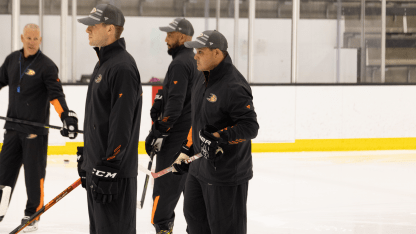
"Having access to those things is just huge," Uisprapassorn said. "I've reached out to guys who have gone pro and to say hey, lay it on me. What am I in for? What should I expect? What I took out of it was you have to be laser focused and intentional.
"But the main thing, after spending some time with coaches in the program, you really start to understand that, at the end of the day, hockey is hockey. The same struggles, the same frustrations, the same issues you're dealing with down at your level, the guys and coaches in the NHL are also most likely dealing with something similar."
One of the challenges unique to his circumstance is Colombia's primary logistical hurdle, the lack of an ice rink anywhere in a country of a 50 million people. The only ice sheet inside the nation's borders, according to Uisprapassorn, is a roughly 10x20 surface located within a shopping mall in the capital city of Bogota.
As a result, the country's most successful players usually go overseas, either to the United States or Europe, to develop the skating skills necessary to compete the game's higher levels. Those back at home in South America, practice on an outdoor street hockey rink, primarily focusing on positioning, team play and other fundamentals they can easily apply to the ice.
The group then comes together for international competitions, like the Pan American tournament in Mexico where Uisprapassorn first took charge, or the Amerigol LATAM Cup, hosted in August at the Florida Panthers' practice facility. To make up for the lack of on-ice sessions together, the team usually arrives much earlier to tournaments than most of its competitors, ensuring they get as much practical preparation as possible before games begin.
Uisprapassorn says building a facility in Colombia remains the desired long-term goal, albeit a lofty one as most of the program's financial support goes to covering travel expenses, but explained the interim set up allows the sport to grow its roots within the country while still giving its youngsters the core skills needed for future success.
Make no mistake though, the formula seems to be working. Under Uisprapassorn's tutelage, the program has sent a player to the ECHL (Daniel Echeverri, who won an SPHL championship with the Macon Mayhem) as well as several others to the junior ranks and captured five championships at the LATAM (Latin American) and IIHF Development Cup levels.
Uisprapassorn, who also manages the club hockey team at his Chapman University alma mater, said the experience at Ducks camp was both a new challenge in a coaching career stocked full of them, but also a remarkable learning opportunity for him, a chance to see the concepts and fundamentals that are most crucial in the world's most competitive hockey league and, more importantly, how they are taught and communicated to professional players.
"I'm a big culture guy and when I got here, I thought wow these guys got a really good culture going here" Uisprapassorn explained. "I saw the way all the coaches collaborate … We put these practice plans together, presented it to Dallas and the collaboration went on [from there]. It felt like everyone put your egos away. These are the concepts [Director of Player Development] Jim Johnson identified. Now let's get into building a practice."
The already special week was brightened even further for Uisprapassorn with the opportunity to work alongside Etem, whose career he closely followed from afar.
"He was the local kid we were all rooting for, regardless of the team he was playing for," Uisprapassorn recalled. "I even called him before camp and asked for the lay of the land, the schedule and what to expect. He was so accessible, so humble and always willing to workshop something with you."
Uisprapassorn said his and Etem's invitations, and the staff's insistence they take a hands-on role, stood out to him as an example of the Ducks' commitment to diversity and inclusiveness, but also an indicator that the sport's commitment to those values continues to progress, a movement in which he's thrilled to play a small role.
"It shows hockey is moving in the right direction. Take what we're doing here in Anaheim and what just happened in San Jose," Uisprapassorn said, referencing the Sharks' recent hiring of Mike Grier as the first black general manager in NHL history. "I know for us, in Colombia, we're going to build a rink down there. When I get to Colombia, I'm standing in front of 25 to 30 12-year-olds. They're all looking at you like you know who they are, but I'm not there as the Colombia national team head coach, I'm there an ambassador of the game. I want these kids to learn this great game."
Now, Uisprapassorn is focused on preparing six Colombian teams (U-12, U-16, U-20, Women's Division-I, Men's Division-I and Men's Division-II) for next month's LATAM Cup. And while he currently has his two hockey "dream jobs," the coach admitted his experience with the Ducks opened his eyes to a potential full-time career in the sport he grew to love.
"Nothing is going to be handed to me," he said. "I'm here to pay my dues, work and chart my path to the NHL one day."


